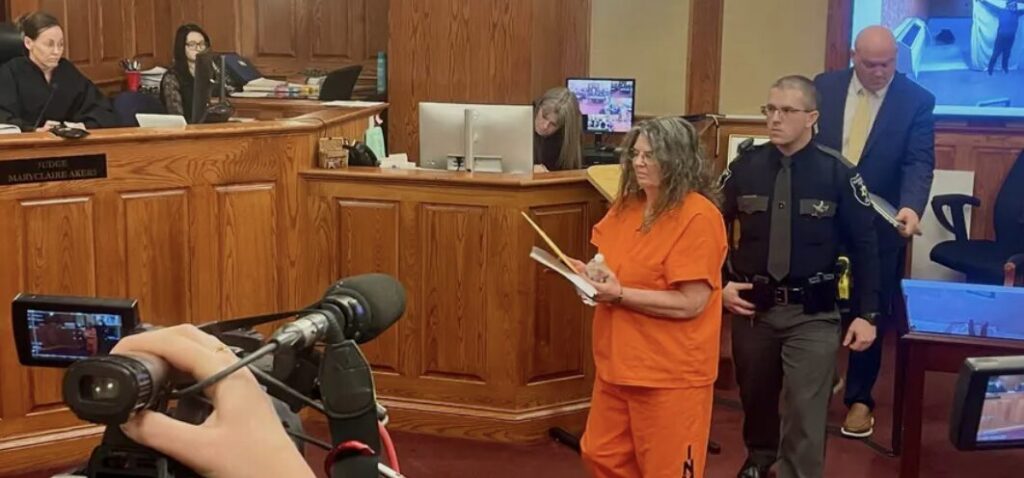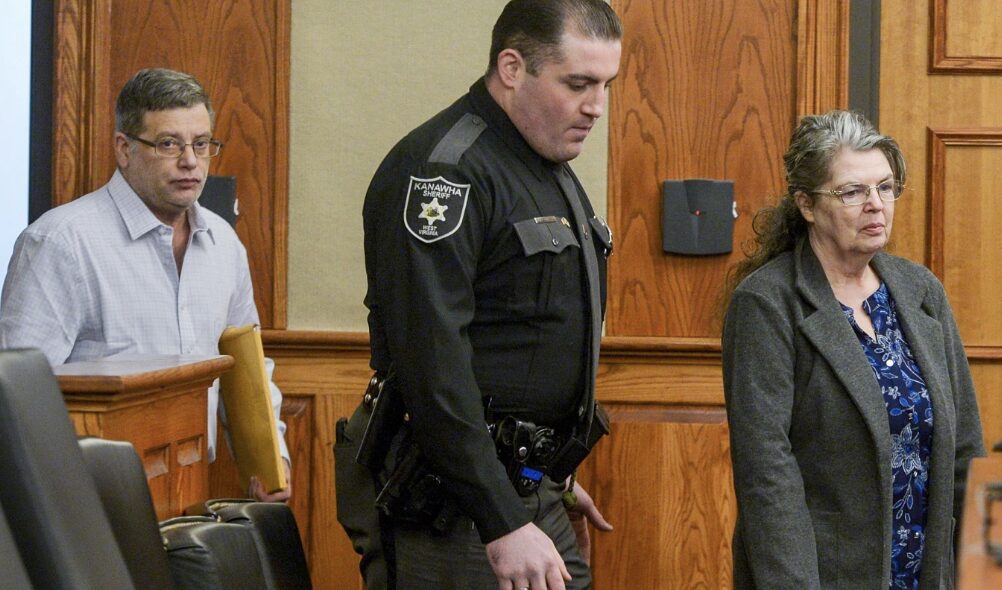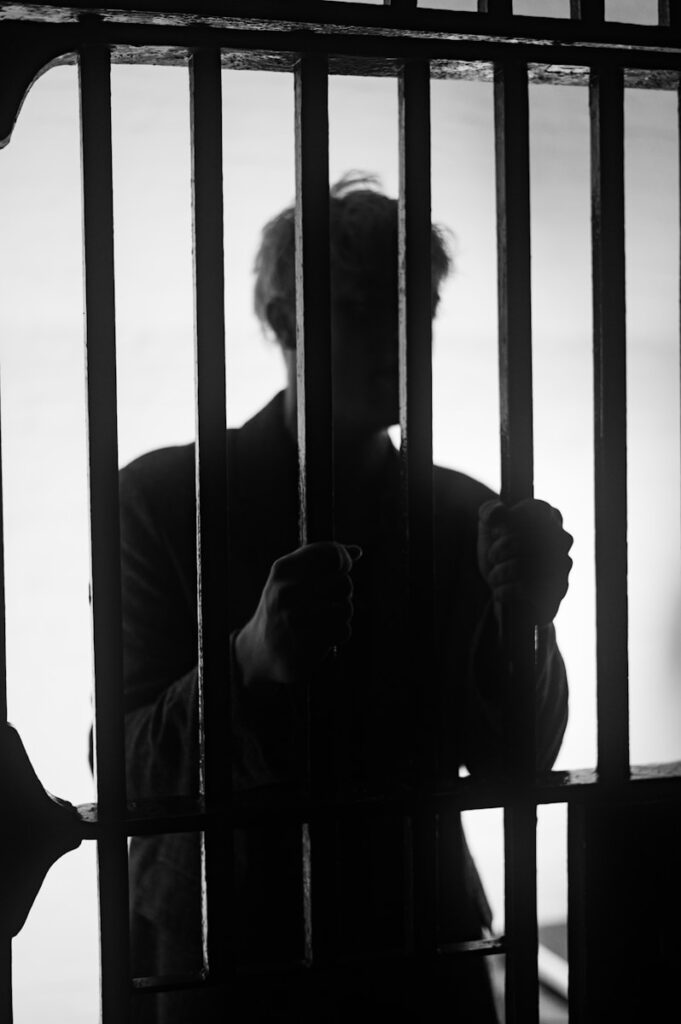
Newsletter Subscribe
Enter your email address below and subscribe to our newsletter

A white West Virginia couple received a combined sentence of 375 years in prison for adopting five Black children and forcing them to work as slaves on their farm.
Donald Lantz, 62, was sentenced to 160 years while his wife Jeanne Kay Whitefeather, 63, received 215 years after being convicted of human trafficking, forced labor, child abuse, and civil rights violations. Kids Used as Slaves.
The couple was arrested in October 2023 after a neighbor reported finding two teenagers, ages 14 and 16, locked in a shed for 12 hours with only a portable toilet and no running water. The children were forced to perform heavy farm labor and were denied entry to the house, living in conditions that prosecutors described as racially motivated abuse.

The case represents one of the most severe examples of modern slavery involving adopted children. During the trial, the oldest daughter testified that the children faced constant verbal abuse and were sometimes forced to stand for hours with their hands on their heads as punishment.
The couple committed multiple serious crimes against five adopted Black children in West Virginia. Police discovered the children living in horrible conditions and being forced to perform heavy labor on the family property.

Police found the children after someone called 911 to report kids trapped in a shed. Officers went to the property in Sissonville, about 15 miles north of Charleston in Kanawha County.
When authorities arrived, they had to break into a backyard shed measuring 20 feet by 14 feet. Inside, they found two children locked in the shed – a 14-year-old boy and a 16-year-old girl.
Police found another 9-year-old girl inside the main house. She was alone and crying while sitting near a railing in a loft 15 feet off the ground.
The shed had no running water or electric lights. There were no beds or mattresses on the hard concrete floor. The children told police they had been locked inside for 12 hours.

Donald Lantz received 160 years in prison for forced labor and human trafficking charges. Jeanne Whitefeather got 215 years for the same crimes plus additional child abuse counts.
A neighbor named Brenda Bailey saw the children doing hard work around the property. She filmed some of it and showed the videos in court. Bailey watched children carry heavy propane tanks and water buckets.
One child could barely walk while carrying a propane tank. His feet looked very sore and he was dragging them. Donald Lantz just stood watching and never helped the struggling child.

Prosecutors said the couple made the children work like machines instead of treating them as family members.
The couple specifically sought out Black children from shelters to abuse. Prosecutors believe they targeted these children because of their race to use them as slaves.
Key Evidence of Racial Targeting:
Assistant Prosecutor Madison Tuck pointed directly at the defendants in court. She asked the jury “You want to know what racists look like? Look at them.”
The couple likely moved the children from an 80-acre ranch they owned in Washington state to their West Virginia property.
The children lived in terrible conditions that showed severe neglect and abuse. They had to sleep on a concrete floor in the shed with no beds or blankets.
Living Conditions:
The 14-year-old boy had painful open wounds on his bare feet. All the children appeared unbathed and had strong body odor when police found them.
Whitefeather claimed in court that the shed was just a “teenage clubhouse” and said the children “liked it.” However, the evidence showed the space was used to lock up and punish the children.
WCHS-TV reported that police waited three hours at the property before Lantz showed up with an 11-year-old boy. Whitefeather arrived one hour later with a 6-year-old girl.
Kanawha County Circuit Judge Maryclaire Akers delivered maximum sentences totaling 375 years in prison for the couple convicted of child abuse and forced labor. The court also ordered substantial restitution payments and heard powerful victim impact statements from the children.
Judge Maryclaire Akers presided over the case and handed down the harshest possible penalties. She delivered maximum sentences to both defendants after their convictions on multiple counts.
The judge made strong statements during sentencing. She told the defendants they brought the children to West Virginia and “put them in hell.” She added that the court would now put them in their own hell.
Akers said the children were “targeted because of their race” to be used “as basically slaves.” She stated she had never seen a case like this one before.
The judge concluded her remarks with harsh words. She said “may God have mercy on your souls because this court will not.”
Jeanne Kay Whitefeather received the longer sentence of the two defendants. She was sentenced to up to 215 years in prison after being convicted on all 19 counts against her. She will be eligible for parole after serving 40 years.
Donald Lantz received a 160-year maximum sentence. He was convicted on 12 of 16 counts brought against him. Lantz will be eligible for parole after 30 years.
Conviction Details:
The charges included forced labor, human trafficking, child abuse, and child neglect. Both defendants received the maximum possible sentences under state law.
The court ordered both defendants to pay $280,000 each in restitution to their victims. This brings the total restitution amount to $560,000.
Several adopted children wrote victim impact statements. The court’s victim advocate read most of these statements aloud during the sentencing hearing.
The eldest child, now 18 years old, read her own statement in court. She directly addressed Whitefeather saying “I’ll never understand how you can sleep at night.” She called Whitefeather “a monster.”
The victim statements allowed the children to confront their abusers directly. These statements showed the lasting impact of the abuse on the children’s lives.
The West Virginia case involving Jeanne Whitefeather and Donald Lantz has raised important questions about adoption oversight, legal consequences for child exploitation, and victim support services. Understanding the legal framework and prevention measures helps clarify how such cases are handled in the justice system.
Jeanne Whitefeather received up to 215 years in prison and will be eligible for parole in 49 years. Donald Lantz was sentenced to up to 160 years with parole eligibility in 36 years.
The jury found them guilty of human trafficking of a minor child, use of a minor in forced labor, gross child neglect, and child abuse. Whitefeather also faced an additional civil rights violation conviction.
Judge Maryclaire Akers imposed the maximum sentences available under West Virginia law. The couple moved to West Virginia in 2023 seeking an isolated location to continue the abuse.
The search results do not provide specific details about how the five adopted Black children were initially discovered or rescued from their abusive situation. Law enforcement and child protective services would typically be involved in such cases.
West Virginia authorities successfully prosecuted the case after the children were removed from the home. The investigation revealed evidence of forced labor, physical abuse, and racially motivated mistreatment.
Federal and state laws address human trafficking, forced labor, and child abuse regardless of the relationship between perpetrator and victim. The couple faced charges under West Virginia’s human trafficking statutes and child protection laws.
Civil rights violations apply when abuse includes racial discrimination or hate-based elements. Child abuse laws carry enhanced penalties when committed by parents or guardians who hold positions of trust.
Forced labor laws specifically prohibit compelling work through physical harm, threats, or coercion. These statutes apply to all situations involving minors regardless of family relationships.
Cases involving adoptive parents exploiting children for labor have occurred in various jurisdictions across the United States. Courts have consistently applied human trafficking and forced labor statutes to family-based exploitation situations.
Legal precedents establish that adoption creates legal parental responsibilities rather than ownership rights. Federal trafficking laws specifically include family-based exploitation within their scope.
Previous cases have resulted in lengthy prison sentences and permanent removal of children from abusive homes. The justice system treats adoptive parent abuse cases with particular severity due to the breach of trust involved.
Child protective services typically provide immediate placement in safe environments following removal from abusive situations. Specialized foster care programs exist for children who have experienced severe trauma and exploitation.
Mental health services address the psychological impacts of abuse, trafficking, and racial trauma. Educational support helps children who may have been denied proper schooling during their exploitation.
Long-term placement options include kinship care, specialized foster families, or therapeutic residential programs. Legal advocates ensure children’s rights are protected throughout court proceedings and placement decisions.
Enhanced background checks and ongoing supervision of adoptive families can identify potential risks before placement. Training for social workers should include recognizing signs of labor trafficking within family settings.
Community members should report suspected child abuse or unusual isolation of children from school and social activities. Mandatory reporting laws require professionals to alert authorities when they observe signs of exploitation.
Post-adoption services and regular home visits help ensure children’s safety and well-being. Educational programs can teach community members to recognize trafficking situations that occur within family structures.